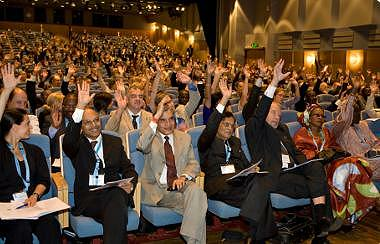 8月21日世界水資源週的與會者全體一致舉手表決通過斯德哥爾摩聲明時(Stockholm Statement)表示,水資源議題必須納入哥本哈根氣候談判的議程。
8月21日世界水資源週的與會者全體一致舉手表決通過斯德哥爾摩聲明時(Stockholm Statement)表示,水資源議題必須納入哥本哈根氣候談判的議程。
來自各公私部門、科研機構和非政府組織近2,000名的水資源專家經過了一週的談判,最終結果敦促協談代表在12月的哥本哈根會議中,務必達成制定一項「強而有力和公平的全球氣候變遷協定。」
斯德哥爾摩聲明表示:「水資源是氣候變遷展現其效應的一個關鍵媒介。妥善資源管理,包括透過周密的水資源綜合管理辦法(IWRM,Integrated Water Resources Management)與跨國合作,是應變規劃和施行計劃,並且建立韌性強的社區、國家和地區成功的關鍵。」
聲明中強調因應氣候暖化目前對社區和生態系產生影響的重要性,表示:「應變為永續發展和減少貧困的先決條件,」並且應變舉措應當納入更廣泛的發展目標中。
聲明中還聲明:「整合水與土地和森林管理是有效應變措施的關鍵。」並且,「生態環境保護和永續發展是應變措施和人類發展的基礎。」
該聲明用以下字眼號召各界進行易發生災難區評估和採用風險管理的做法:「透過水資源的循環週期,得知最易受氣候變遷波及地點的人口和生態系,將有助於區域或熱點的鎖定或及時進行干預;其中包括乾旱地區、高度依賴地下水地區、小島型的發展中國家、低窪三角洲地帶和易發生災難的山區。」
最後,聲明更呼籲各界踴躍分享信息,並有更多「新的和額外款項的贊助。」
在哥本哈根協議完成制定後,政府應當致力透過對話加強全球合作的機制,達成強化全體一致的水資源和應變措施行動。
最後,水資源團體表達了其「致力於在妥善的機制和體制安排下,加強水資源和更多其他開發團體各機構間全面合作的決心,匯聚集體的力量以解決未來發展所面對的巨大挑戰。」
Water must be an integral part of the climate negotiations in Copenhagen, World Water Week participants today said with a unanimous show of hands in support of The Stockholm Statement.
The final outcome of a week of talks by some 2,000 water experts from the public, private, scientific and NGO sectors, the statement urges negotiators working towards a global climate change deal in Copenhagen in December to reach a "strong and fair agreement."
"Water is a key medium through which climate change impacts will be felt," says the Stockholm Statement. "Managing the resource effectively, including through well-conceived IWRM [Integrated Water Resources Management] approaches and at a transboundary level, is central to successful adaptation planning and implementation, and to building the resilience of communities, countries and regions."
The statement highlights adaptation to the impacts that a warming climate is already having on communities and ecosystems, saying, "Adaptation is a prerequisite for sustainable development and poverty reduction," and adaptation measures should be integrated into broader development goals.
"Integration of water with land and forest management is key to effective adaptation," and "Ecosystem protection and sustainability is fundamental to adaptation and human development," the statement declares.
The statement calls for vulnerability assessments and risk management practices in these words, "Knowing where and how the impacts of climate change are most likely to affect populations and ecosystems through the water cycle will help in the identification of areas for early intervention or hot spots; these include arid regions, areas highly dependent on groundwater, small island developing states, low-lying deltas and fragile mountainous areas."
Finally, the statement calls for more sharing of information as well as "new and additional funds."
After the Copenhagen agreement is finalized, governments should work through dialogue to strengthen global mechanisms that can enhance collective action on water and adaptation.
Finally, the water community expressed its "commitment to strengthening institutional cooperation at all levels between the climate, water and wider development communities under appropriate mechanisms and institutional arrangements in order to work more collectively to address the immense development challenges ahead."




